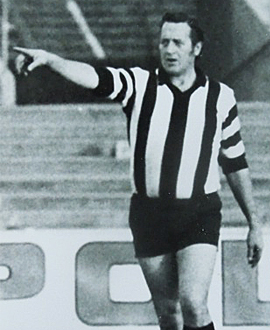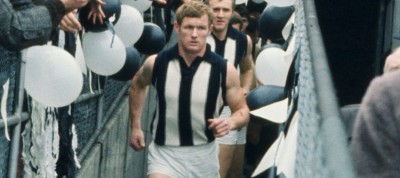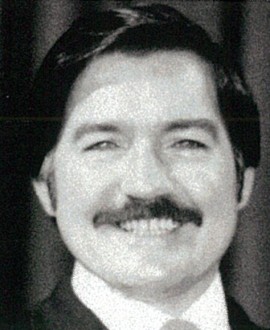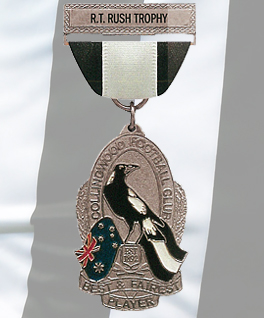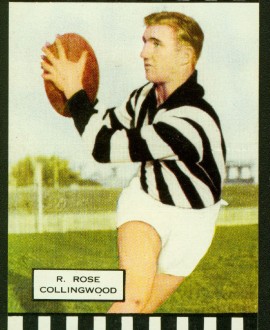
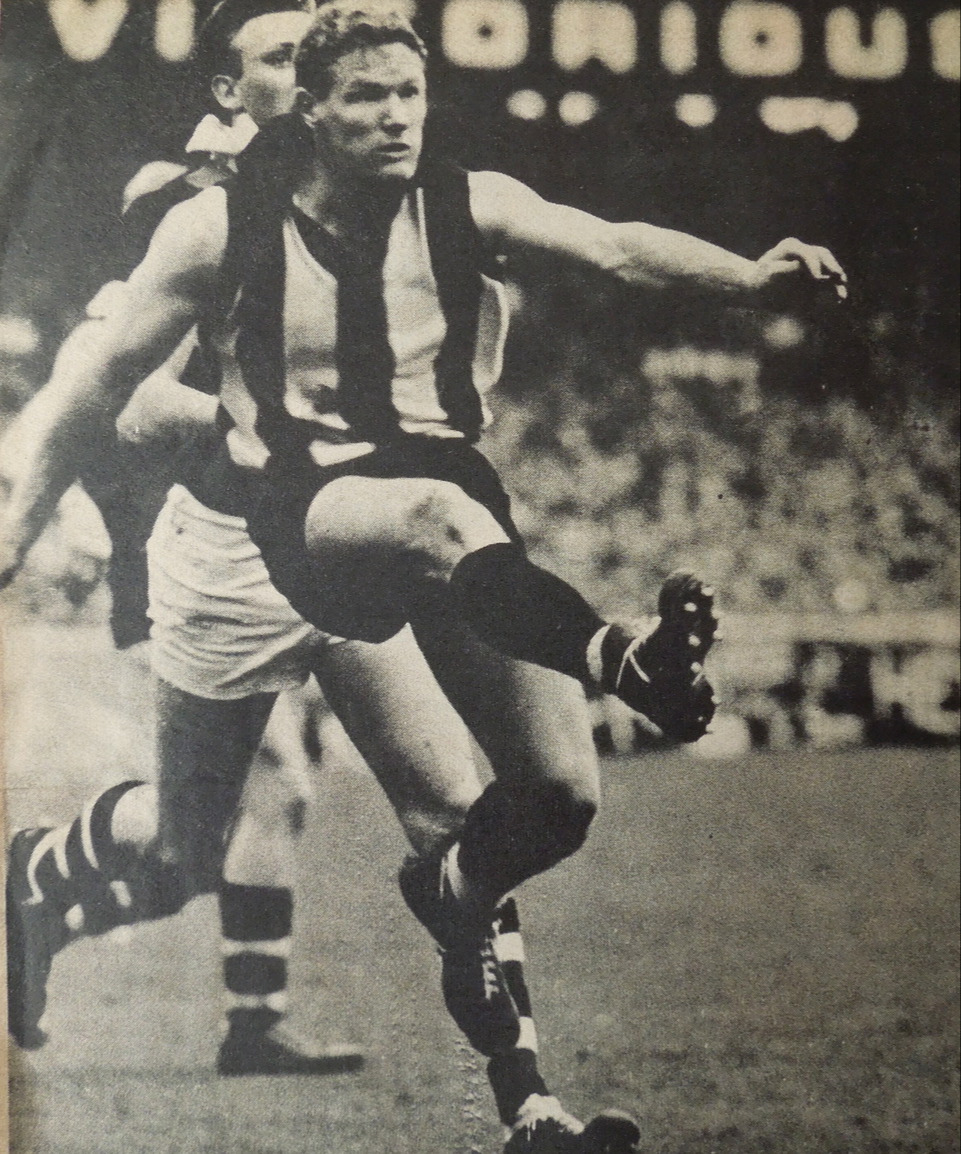
In his 12 years and 182 games at Victoria Park, Des Tuddenham time and again proved himself to be one of the most inspirational players Collingwood has ever seen. And his importance to the team was never better demonstrated than in the dying minutes of the 1966 second semi-final.
At the 22-minute mark of the last quarter, St Kilda was three points up. “Tuddy” had already kicked four goals that day, but in the remaining minutes of play he simply took the game by the throat. In a six-minute rampage he booted three astounding goals, enabling Collingwood to storm home to a memorable, last-gasp victory. After each one he charged back to the centre of the ground with his fists clenched, urging and exhorting his teammates to keep up the momentum. Anyone not inspired by the sight must have had ice water running through their veins. A triumphant Tuddenham was chaired from the field by his jubilant teammates.
Those few frenetic minutes of football were vintage Tuddenham. They were the perfect example of why fans loved him, teammates were in awe of him and opponents feared him. He epitomised all that was Collingwood, and played a style of game that Magpie legend would have us believe was the province of only those who wore the black and white jumper. As with men such as Harry and Albert Collier, Bob Rose, Tony Shaw and Nathan Buckley, Tuddenham holds a special place in this club’s history as one of its most inspirational players, and as one of its greatest on-field leaders.
Reared on a farm at Ross Creek, 22 kilometres (14 miles) west of Ballarat, Des was born into a footballing environment. He and his six brothers all loved the game and spent countless hours in a paddock near their home, kicking a football around until the light faded and they could no longer see the ball. He started playing football at age eight, when he joined the Ballarat YCW under-14 side. He played for the YCW club for nine years, and climaxed his junior career by winning the local league’s under-19 competition best and fairest award in 1961.
That win set the VFL talent scouts on his trail, but Tuddenham proved an elusive target – because he wanted to play for Collingwood. Ironically, he got his chance by virtue of another of his early sporting interests, cricket. Tuddenham was a handy fast-medium bowler who came to Melbourne in the summer of 1961-62 to play in the highly competitive Country Week cricket. One of the games in which he was playing was held at Victoria Park, where two rival clubs came to seek his signature. Their presence piqued the Magpies’ interest – and Des was a Magpie within the week.
A few weeks later Tuddenham, who had just turned 19, starred in the club’s 1962 practice matches. He was named on the club’s senior list, and after just five reserve games won himself a spot on the bench for the firsts against Geelong in round five. When named on a half-forward flank for his first full game a few weeks later against North Melbourne, he made a flying start, goalling early in the game. From that moment he never looked back.
Despite his youth and lack of eperience, Tuddenham was shifted into the centre for the 1963 season and he responded magnificently, winning the Copeland Trophy. He briefly, but seriously, considered going home to Ross Creek before the 1964 season but was convinced to stick it out for a little longer. Luckily he stayed.
He finished runner-up in the Copeland in both 1965 and ’66 and in 1965 he also won interstate selection for the first time. But it was in 1966 that Des achieved his most cherished ambition when, aged just 23, he was appointed Collingwood captain. It was a remarkable achievement for one who had been a part of League football for only four years.
Tuddenham’s heroics during these years were not limited exclusively to the centre position. He also often played as a ruck-rover, or on a half forward flank. Wherever he was positioned, he was regarded by the opposition as the danger man of the Collingwood team.
Though Tuddy was well skilled, his game was never one of style or grace. He stood 178cm (5ft l0in) tall and weighed a solid 82.5kg (13 stone). He was a fitness fanatic who ran professionally during the summer, once winning a half-mile event at Wangaratta. He had a robust, stocky frame that was well equipped to deal with the battering to which he frequently subjected it. He was not a strong mark but he was an excellent right-foot kick and a magnificent shot for goal — whether on the run or with snap shots from acute angles.
For all his skills it was his approach to the game for which Tuddy is best remembered. His strength, desperation, courage and fierce will-to-win were second-to-none. He was also one of the few genuinely tough, hard players in a succession of Collingwood teams that were among the most skilful the club has seen. As such he was often called upon to act as a kind of mini-enforcer.
All these qualities made him a formidable opponent in any contest, and one of the most valued teammates in football. “He was a sensational leader and one of the most inspirational players you would see,” said Bob Rose. “He just hated defeat, and was completely ferocious in his attitude to winning. You could not want a better captain.” Terry Waters, the man who replaced Tuddenham as skipper, remembered most his determination. ‘The book Kill For Collingwood could have been written about Des,” he said. “He had fierce determination, and a desperation to win at all costs. He was an inspiration to everyone at Collingwood.”
With his strong, skilled and fearless play, and an apparently intense devotion to the black and white jumper, Tuddenham was considered by many to be the archetypal Collingwood footballer. To kids in the sixties he was held up as an example of how past Collingwood greats had played, and of what the famed “Collingwood spirit” was all about. All of which made his pay disputes with the club and his eventual departure to Essendon in the early seventies so much harder to bear.
The footy world was rocked when Tuddy and Len Thompson went ‘on strike’ during the 1970 pre-season, looking for a better pay deal in the wake of Collingwood’s recruitment of Subiaco’s Peter Eakins on a big money transfer. By mid-March they had relented and returned, but Tuddenham was stripped of the captaincy. In 1971 many people, including coach Bob Rose, wanted to see Tuddenham reclaim the captaincy — they felt he had been punished enough. But resentment over his wage demands still lingered, and the job stayed with Terry Waters. Tuddenham again responded by refusing to play, and once again he relented — this time on the understanding that he would be cleared at the end of the season.
Ironically Tuddenham’s 1971 turned out to be his most successful season in several years, finishing second in the Copeland Trophy and even being named captain of the Victorian team — an appointment that was widely seen as a slap in the face to those who had denied him the captaincy at Collingwood.
It was a messy, unsatisfactory end to Tuddy’s Collingwood career. He went to Essendon as playing coach in 1972 and spent four years there. He returned to Victoria Park in 1976, as captain, but his season ended abruptly in the 12th round when he broke his wrist playing against Carlton at Victoria Park. He returned to play the first two games of 1977 before his battle-scarred knees finally gave out against North Melbourne and forced him into retirement.
Despite his “strikes”, despite his departure to Essendon and despite the occasional off-field problem, Tuddenham has always been — and still remains — a firm favourite of the Victoria Park faithful. The reason for those feelings is simple; Des Tuddenham played his football the way every Magpie supporter likes to see it — the Collingwood way.
- Michael Roberts
CFC Career Stats
| Season played | Games | Goals | Finals | Win % |
|---|---|---|---|---|
| 1962-1971, 1976-1977 | 182 | 251 | 13 | 63.7% |
CFC Season by Season Stats
| Season | GP | GL | B | K | H | T | D | Guernsey No. | ||
|---|---|---|---|---|---|---|---|---|---|---|
Other CFC Games
| Team | League | Years Played | Games | Goals |
|---|---|---|---|---|
| Collingwood | Night/Pre-season | 1962 - 1977 | 4 | 3 |
| Collingwood | Reserves | 1962 - 1963 | 7 | 1 |
Also Played For
| Team | League | Years Played | Games | Goals |
|---|---|---|---|---|
| Essendon | VFL | 1972 - 1975 | 69 | 66 |
Awards



 x5
x5




 x2
x2
 x3
x3


